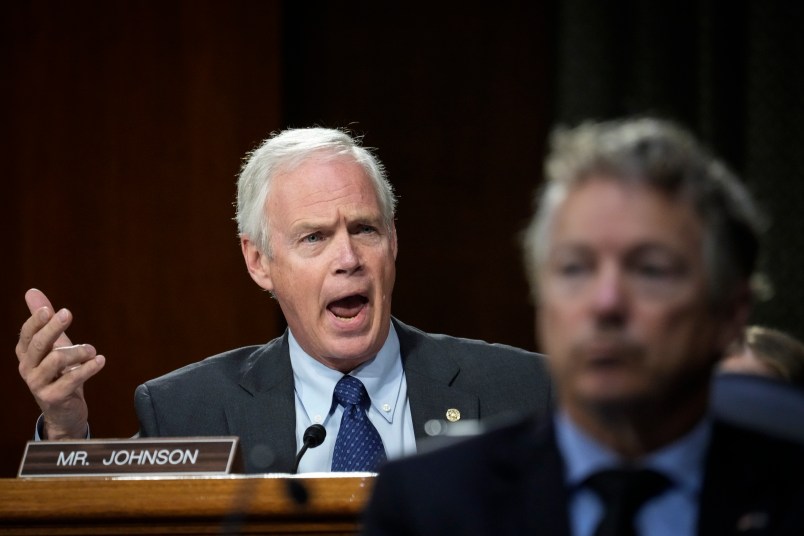Senate Republicans torpedoed a procedural vote to start moving past Sen. Ron Johnson’s (R-WI) blockade of the “minibus,” or bundle of three spending bills, that has ground action in the chamber to a halt.
Up until Johnson’s objection late last week, the Senate was chugging along in an unusually bipartisan manner, in stark contrast to the Republican infighting that has riven the House. Democrats subsequently set up votes to try to circumvent Johnson’s blockade, though they required significant Republican cooperation.
They didn’t get it Wednesday, and Democrats took to the floor to express their disappointment.
“It is pretty hard to square with a lot of the talk that we hear all the time about wanting to work together, wanting to break the pattern of partisanship, wanting to help people, wanting to solve problems,” Sen. Patty Murray (D-WA), head Democratic appropriator in the Senate, said Wednesday after the vote failed. “To say nothing of how some of our loudest complainers talking big about their commitment for us to return to regular order, who have been railing against these omnibus bills at the end of the year, led the effort to halt our best shot in years at actually getting closer to regular order and possibly setting us on a collision course for another massive omnibus.”
Sen. Susan Collins (R-ME), the Republicans’ head appropriator, told Punchbowl News that she’d voted against moving towards ending Johnson’s blockade because she wants a way out that doesn’t require scrounging up 67 votes to temporarily change Senate rules.
Johnson had floated that he’d lift his objection if the chamber voted on Sen. James Langford’s (R-OK) bill to end government shutdowns, which would implement rolling 14-day continuing resolutions to keep the government funded.
But time, now, is of the essence.
The government will shut down at the end of the month, leaving senators very little time to pass their tranche of spending bills.
“Democrats want to reach an agreement with our Republican colleagues that will pass the minibus and make up for the time lost because of Senator Johnson’s obstruction,” Senate Majority Leader Chuck Schumer (D-NY) said after the failed vote Wednesday.
Emissaries from the hard right and moderate flanks of the House came up with a short-term funding bill over the weekend, but Schumer already dismissed it as dead on arrival in the Senate. It may not even be able to pass through the House, as Republican leadership abruptly pulled it from the floor Tuesday morning.
The Senate may have to craft its own continuing resolution to keep the lights on — and figure out a vehicle for it, as revenue-raising bills, historically expanded to all spending bills, must originate in the House — as lawmakers strategize about how to appease Johnson or otherwise sidestep his blockage. But the Senate’s power to avert a shutdown is limited, given that the House is currently paralyzed by the unending demands of its rightmost contingent.
Democrats, largely hamstrung by the Republican antics, are sitting back to watch the show, confident that at least the House Republican caucus will shoulder the blame should the government be forced to shutter.



